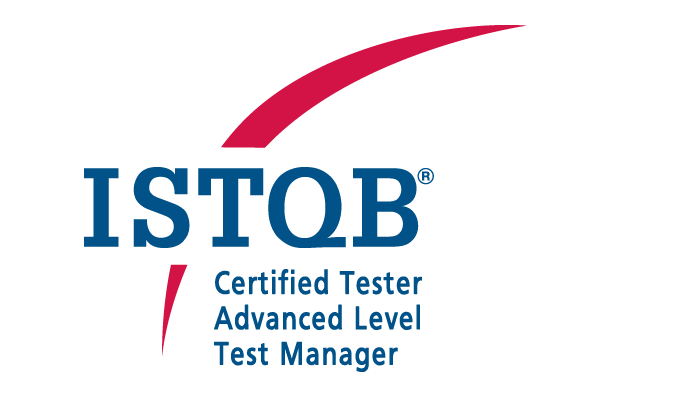ISTQB Advanced Test Manager Certificate (CTAL – TM)
ISTQB (International Software Testing Qualifications Board) is the standard for international qualifications in software testing at an advanced level. This course, with its large number of practical exercises and practice examination questions, fully prepares delegates for the ISTQB Certified Tester Advanced Level Test Manager examination. Whilst this course is focused on the syllabus, giving delegates the maximum chance of passing the examination, it also contains many real-world practical examples.
The Advanced Level qualification is aimed at people who have achieved an advanced point in their careers in software testing. This includes people in roles such as testers, test analysts, test engineers, test consultants, test managers, user acceptance testers and software developers.

It is also appropriate for anyone who wants a deeper understanding of software testing, such as the following;
- Project Managers
- Quality Managers,
- Software Development Managers,
- Business Analysts,
- IT Directors
- Management Consultants.
Course Outline
This five-day course follows the ISTQB Advanced Level Test Manager syllabus and covers the following:
Basic aspects of software testing
- Review of the Certified Tester Foundation Level syllabus
- Specific systems (application domains)
- Testing and the software development life cycle
- Test process
- Stakeholders
- Ethics
Risk
- Risk management
- Failure Mode and Effect Analysis (FMEA)
Test management
- Test policy
- Typical test strategies
- The test strategy document
- Master test plan
- Level test plan
- Test estimation
- Scheduling test planning
- Test monitoring, reporting, and control
Test management issues
- Business Value of Testing
- Distributed, Outsourced, and Insourced Testing
- Test management issues for exploratory testing
- Test management issues for systems of systems
- Test management issues for safety-critical systems
- Other test management issues
Reviews
- Principles of reviews
- Types of review
- Introducing Reviews
Incident management
- Incident reports
- When can an incident be identified
- The incident management process or defect life cycle
- Defect fields
- Metrics and incident management
- Communicating incidents
Standards
- ISO Standards
- IEEE Standards
- BSI Standards
- Industry-specific and other standards
Test process improvement
- The purpose of test process improvement
- Testing Maturity Model (TMM)
- Test Process Improvement (TPI)
- CTP (Critical Testing Process)
- STEP (Systematic Test and Evaluation Process)
- Improving the Test Process
- Capability Maturity Model Integration, CMMI
Tools
- Test tool concepts
- Test tools categories
Standards
- ISO Standards
- IEEE Standards
- BSI Standards
- Industry-specific and other standards
Test process improvement
- The purpose of test process improvement
- Testing Maturity Model (TMM)
- Test Process Improvement (TPI)
- CTP (Critical Testing Process)
- STEP (Systematic Test and Evaluation Process)
- Improving the Test Process
- Capability Maturity Model Integration, CMMI
Tools
- Test tool concepts
- Test tools categories
People skills
- Individual skills
- Test team dynamics
- Motivation/ Communication
Prerequisites
- To take the ISTQB Certified Tester Advanced Level qualifications, delegates must hold the ISTQB Foundation certificate and it is also recommended that candidates hold a bachelor degree or equivalent degree in software engineering or have a minimum of 3 years testing experience.
- Delegates are also encouraged to spend more time than during the course to further their knowledge of software testing including reading the ISTQB Advanced Level syllabus prior to attending the course and considering some of the additional reading references listed in the syllabus. The syllabus is available online at http://www.istqb.org/downloads.html.
- Many delegates have also taken additional hands-on training courses to prepare themselves to get the most benefit from this challenging course and examination.
The Exam
The ISTQB Advanced Level exam lasts three hours and consists of 65 scenario-based multiple-choice questions. An additional 45 minutes is allowed for candidates taking exams that are not in their native business language. No notes, study guides or books are allowed into the examination session. Candidates need to score at least 65% to pass the exam and be awarded their certificate.
Ready to get started?
Get in touch, or register
